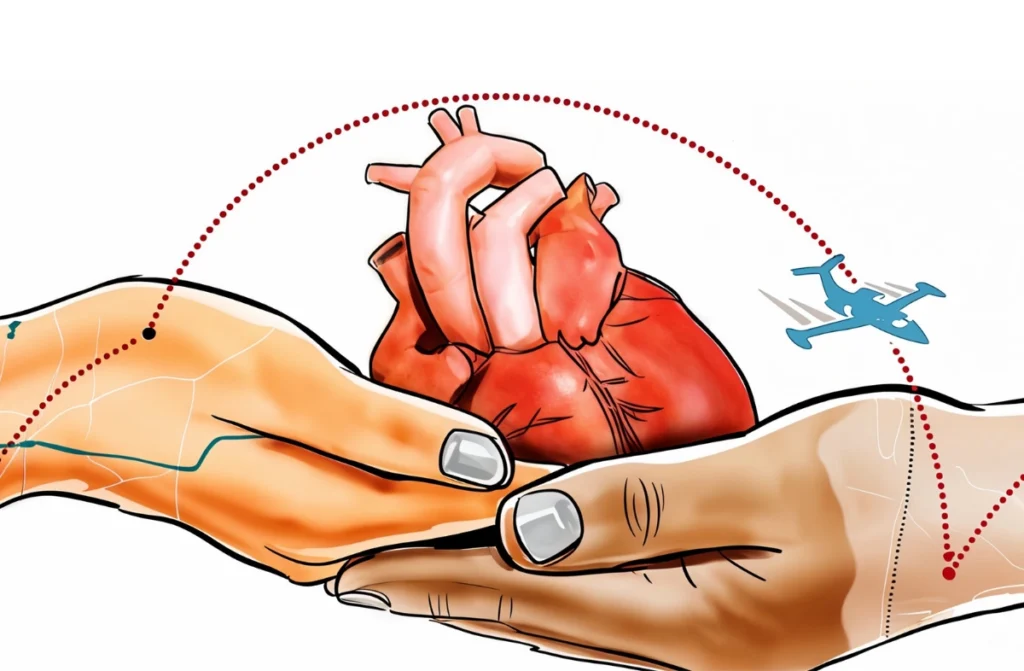Heart transplantation is a life-saving procedure for patients suffering from end-stage heart failure or severe heart conditions. In Chennai, some of the best heart transplant hospitals offer this complex surgery, providing hope to those with heart disease when other treatments have failed. If you or someone you know is considering best heart transplantation in Chennai, it’s important to understand the process, who needs it, and what the recovery looks like.
In this guide, we will explore the essential aspects of best heart transplantation in Chennai, including the procedure, risks, benefits, and recovery. Leading heart transplant hospitals in Chennai specialize in providing excellent care and using state-of-the-art technology to ensure the best outcomes for patients. Whether you’re seeking more information about the surgery or specific details about the heart transplant hospital in Chennai, this article will guide you through all the crucial aspects of heart transplantation.
What is a Heart Transplant?
A heart transplant is a surgical procedure in which a patient’s diseased or damaged heart is replaced with a healthy donor heart. This procedure is typically performed when a person’s heart is no longer able to pump blood effectively, even with medical treatment. Heart transplantation in Chennai is performed at various renowned heart transplant hospitals, where skilled surgeons and medical teams provide the necessary expertise.
The process involves removing the failing heart and connecting the donor heart to the patient’s blood vessels. After a successful heart transplant, the patient’s health improves significantly, and they can enjoy a better quality of life. This procedure is considered when other treatments, such as medications or mechanical heart devices, fail to offer a solution. A successful heart transplant can provide life-saving results, offering patients a second chance at life.

Who Needs a Heart Transplant?
Heart transplantation is often recommended for individuals who have severe heart conditions that cannot be managed through medications or other treatments. These include:
- End-Stage Heart Failure: When the heart can no longer pump enough blood to meet the body’s needs.
- Coronary Artery Disease: Blockages in the heart’s arteries that cannot be treated with bypass surgery or stents.
- Cardiomyopathy: A condition where the heart muscle becomes weak and enlarged.
- Congenital Heart Defects: Birth defects that affect the heart’s structure.
- Arrhythmias: Life-threatening heart rhythm disorders that do not respond to treatment.
Best Heart transplantation in Chennai is available for individuals who meet these criteria and are under the care of experienced heart surgeons at the city’s leading heart transplant hospitals. It is a life-saving option when other therapies have not worked.
How Common Are Heart Transplants?
Heart transplantation is a highly specialized procedure that is performed when all other treatments fail. In Chennai, heart transplantation is becoming more common, thanks to the availability of advanced medical technologies and highly skilled surgeons. The number of heart transplants performed annually has been increasing as more patients are diagnosed with heart failure and other severe conditions. However, the demand for donor hearts often exceeds the supply, making it a relatively rare procedure.
Key facts:
- Increasing Demand: The need for heart transplants is rising due to lifestyle factors such as unhealthy diets, smoking, and lack of exercise.
- Availability of Donor Hearts: Finding suitable donor hearts is often a challenge, but leading heart transplant hospitals in Chennai are part of national and international organ-sharing networks.
- Success Rates: The success rates of heart transplants in Chennai are comparable to global standards, thanks to advanced medical infrastructure.
Procedure
The heart transplant procedure in Chennai typically involves the following steps:
- Preparation: The patient undergoes thorough screening to determine eligibility for a heart transplant. This includes medical tests, heart assessments, and organ compatibility checks.
- Surgery: The patient is placed under general anesthesia. The surgeon makes an incision in the chest, removes the failing heart, and connects the donor heart to the blood vessels.
- Recovery: After the procedure, the patient is closely monitored in the intensive care unit (ICU) for several days to manage any complications.
- Post-Transplant Care: Patients need to take medications to prevent organ rejection and monitor their health regularly.
Best Heart transplantation in Chennai is performed with precision and care, ensuring that the patient’s heart function improves significantly after the surgery.
Risks
Like any major surgery, heart transplantation carries certain risks. These include:
- Rejection: The body may reject the donor heart if the immune system does not accept it.
- Infections: The use of immunosuppressant drugs to prevent rejection increases the risk of infections.
- Complications from Surgery: These may include bleeding, blood clots, or problems with the heart or lungs.
- Graft Vasculopathy: This is a condition where the blood vessels in the transplanted heart become narrowed over time.
- Organ Failure: The transplant may fail, requiring additional treatment or a second transplant.
Patients undergoing heart transplant in Chennai are carefully monitored to minimize these risks and ensure the best possible outcomes.
Benefits
A heart transplant offers several benefits, including:
- Improved Quality of Life: Patients often experience a significant improvement in their physical health, with better stamina and energy levels.
- Increased Life Expectancy: With a successful transplant, patients can live many more years compared to those who do not undergo the procedure.
- Relief from Symptoms: Heart transplant patients often experience relief from symptoms such as shortness of breath, fatigue, and chest pain.
- Better Heart Function: The new heart provides better circulation and oxygen to the body, which can improve overall health.
Heart transplantation in Chennai offers these life-changing benefits, giving patients a second chance to live an active and fulfilling life.
Recovery
The recovery process after a heart transplant in Chennai typically involves:
- Immediate Recovery: The first few days after the surgery are critical. Patients are closely monitored in the ICU to detect any early complications.
- Rehabilitation: After stabilization, patients begin a rehabilitation program to regain strength, improve mobility, and learn how to manage their health.
- Long-Term Care: Patients need lifelong monitoring and medication to prevent rejection and complications.
Chennai heart transplant hospitals provide comprehensive post-transplant care, ensuring that patients recover fully and live a healthy life after the surgery.
Heart Transplantation Cost in Chennai
The heart transplantation cost in Chennai varies based on several factors, including hospital facilities, surgeon expertise, and post-operative care. On average, the cost ranges between ₹15 lakhs to ₹25 lakhs, covering:
- Pre-Transplant Evaluation – Diagnostic tests and assessments
- Surgical Procedure – Surgeon fees, hospital stay, and OT charges
- Post-Operative Care – ICU stay, medications, and rehabilitation
Many hospitals offer financial assistance programs and insurance coverage for Heart Transplant in Chennai, helping patients manage the expenses efficiently.
| Cost Component | Estimated Price Range (INR) |
|---|---|
| Pre-Transplant Evaluation | ₹2,00,000 – ₹4,00,000 |
| Donor Heart Procurement | ₹3,00,000 – ₹5,00,000 |
| Surgical Procedure | ₹8,00,000 – ₹12,00,000 |
| Hospital Stay & ICU Charges | ₹3,00,000 – ₹6,00,000 |
| Immunosuppressive Medications | ₹50,000 – ₹1,50,000 per year |
| Rehabilitation & Follow-up | ₹1,00,000 – ₹2,00,000 per year |
| Total Estimated Cost | ₹15,00,000 – ₹25,00,000 |
Conclusion
Heart transplantation in Chennai is a life-saving procedure offered at some of the best heart transplant hospitals in the country. With advanced medical technologies, skilled surgeons, and comprehensive post-surgery care, patients can expect improved heart function and a better quality of life. If you’re considering best heart transplantation in Chennai, it is important to choose a heart transplant hospital in Chennai with experience and expertise in performing successful transplants. The procedure comes with risks but offers many benefits, including improved health and increased life expectancy. Chennai heart transplant hospitals provide hope and a second chance for patients suffering from end-stage heart failure and other severe heart conditions.
Read also: Angioplasty and Stent Placement

